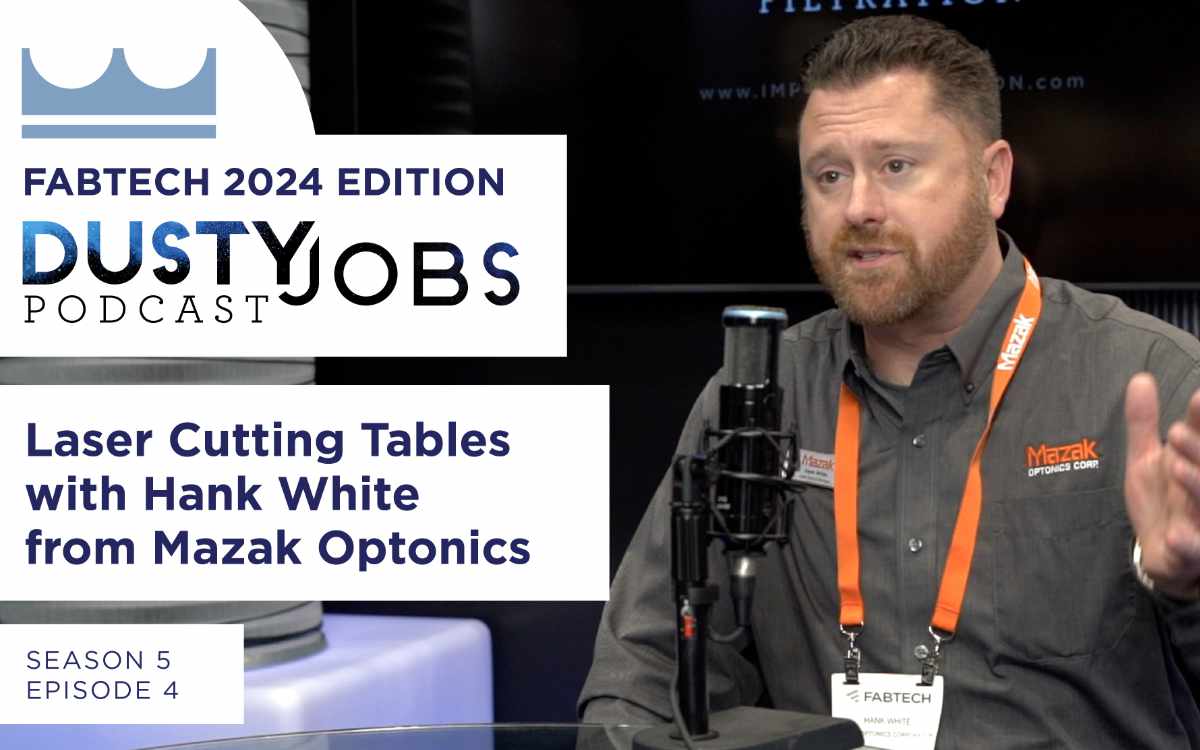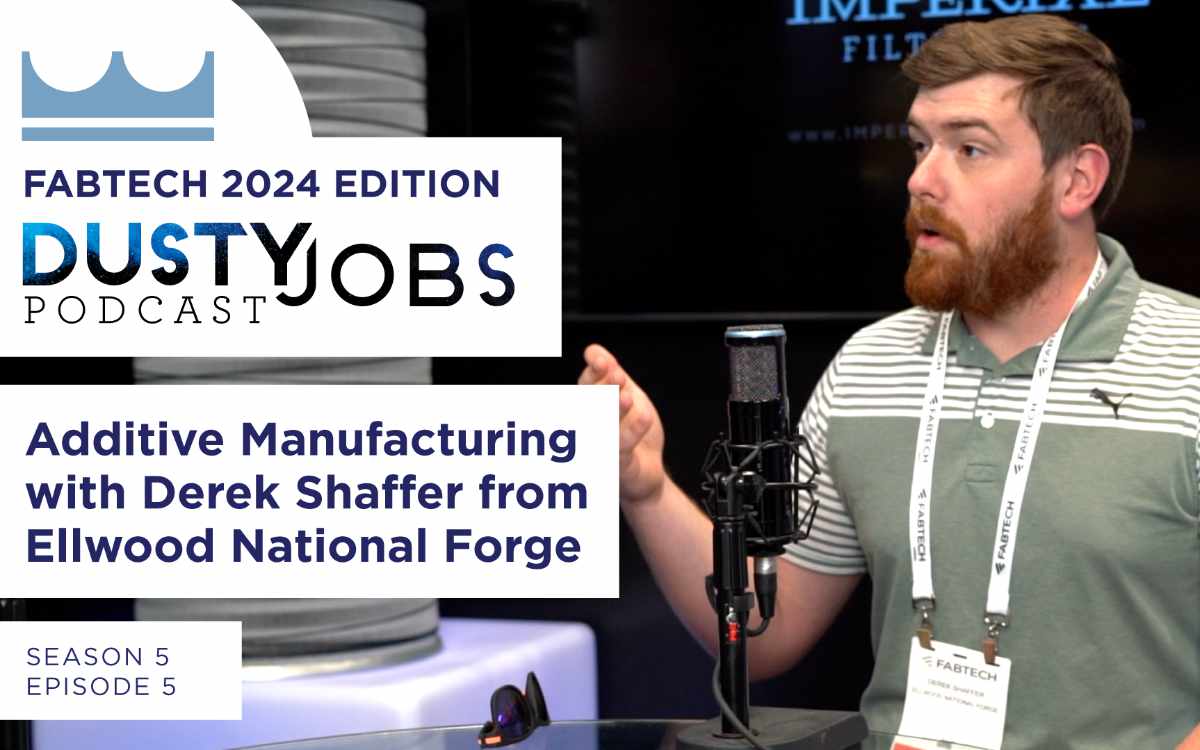Today is Veterans Day and our guest John Poehler is one our Reps from the West Coast. He also flew helicopters in the Marine Corps, including Marine One for the President. Listen to this podcast to hear about John’s career in the Marines and also about his transition to dust collection.
Dusty Jobs Podcast Episode 11 – Veterans Day with John Poehler
Narrator: Welcome to the Dusty Jobs Podcast from Imperial Systems. Industry knowledge to make your job easier and safer.
Donovan: Hello, and welcome to another episode of the Dusty Jobs Podcast. Today we’re doing a special Veterans Day episode. Joining us today is one of our representatives, John Poehler. How are you doing today John?
John: I’m doing great. How are you?
Donovan: Great.
John: Thanks for having me.
Donovan: Thanks for coming on. John’s company is Semper Fi Industrial Solutions out in California, right?
John: That is correct.
Donovan: How’s it going out there? How’s everything out in California?
John: So far, with the present conditions we’re living in we’re actually doing pretty well. I think overall industry is beginning to improve as we fight our way through what we’re presently going through.
Donovan: These are some challenging times but it’s good to know you’re doing well and healthy out there and things are going good. That’s great to hear. Now the reason we have you on today is because you have some past military experience.
John: That’s true.
Donovan: So you were in the Marines, right?
John: I was. I joined the Marine Corps, I guess, officially with commission in 1990 and then retired in 2012.
Donovan: So during your time in the Marines I see you’ve got a picture there beside you in the background. Is the a helicopter?
John: Yes, correct. It’s my office, and the wife lets me put up pictures in the office. They’re all helicopters for the most part.
Donovan: There you go. Is that what your role was most of the time in the Marines? Was that your job? Can you tell us a little bit about how you started in the 90’s and then kind of walk us through your time in there if you don’t mind.
John: I mean originally I’m a Wisconsin kid. I went to the university of Wisconsin and was commissioned in the Marine Corps in December ’90. I then went off to a couple different things but ended up in flight school down in Pensacola, Florida and Corpus Christi, Texas. I ended up going to a fleet squadron out at Camp Pendleton in California, and I was there ’93 to ’99, roughly. It was all helicopters and several deployments out of those different units all to Asia and southwest Asia. Then in ’99 I went back to Quantico in Virginia. I joined another squadron there, HMX-1. I spend about five years in Quantico itself.
Then I came back out, deployed again out here on the west coast out of Camp Pendleton. Great group of guys. Not only great boss, a couple great bosses, but just great young Marines and sailors that I was fortunate to be with. We went up to west Al Anbar in Iraq. I came home from that in ’07. I ended up going to a Marine Corps air station in Yuma, Arizona, and, again, another great boss, another great two and half or three years with a great group of young Marines and sailors out there, primarily doing search and rescue out in the desert area of Yuma and surrounding areas. Then I retired out of Yuma, Arizona and moved back to San Diego California.
Donovan: Nice. So, during that time frame what would you say was the most exciting thing you got to do? Did you get to do anything interesting or different, something that just really sticks out you?
John: I’m very fortunate. I was able to fly the vast majority of my time because I was in different squadrons for the most part. I was very fortunate. I had great commanding officers for the most part. I worked with phenomenal young Americans, both Marines and sailors. Absolutely phenomenal, the best this country has to offer. In terms of the missions that we flew, a great variety. Again, I was very fortunate. From fleet squadrons, and deploying with the unit to a squadron in Quantico, Virginia that did presidential service to Yuma, Arizona doing search and rescue and working for the local community, both the local community and state and federal agencies. It was all a wonderful experience across the board. I thoroughly enjoyed it. So I probably can’t pick out any one thing. Every duty station brought something special.
Donovan: That sounds like a really interesting time. Never a dull moment. Now, I’m going to ask you this: Did you get a chance to fly the president?
John: *laughs* Yeah, a couple times.
Donovan: Oh, well that’s got to be pretty exciting.
John: Oh, extremely. Again, if I haven’t said it, that was a phenomenal group also of friends to this day, and we still meet up and have dinner or breakfast, coffee, whatever the case may be. Maybe grab a beer. Whatever. Phenomenal group. We’re all aging a bit now. It’s hard to believe that it’s been fifteen, twenty years ago that I was there. It was a wonderful experience. Wonderful travel.
Donovan: That sounds great, and like I said, thanks for all you’ve done for serving. It seems an interesting jump from flying the president in a helicopter to now working with Imperial Systems in dust collection. How in the world did that come about?
John: It is funny. It is humorous, but for me it has been an absolutely wonderful journey. When I retired from the Marine Corps, again, you’ve been doing this for so long, twenty plus years, you don’t know what your supposed to do. I got out, very typical, I became a contractor, a DOD contractor for a year. I worked at Camp Pendleton. Low and behold, an older gentleman – you know, I’ve been very fortunate with mentors and friendships. An older gentleman from church, he was an usher, he is an usher. He reached out to me one day and told me about this industrial rep business. He was a rep here in southern California. I’ve known him for several years.
Anyways, one thing led to another and before you knew it I was working for a manufacturer and lasted for about four years. I met wonderful people, including Tomm Frungillo. He was my boss for a while. Anyways, I ended up going on my own, and, again, great mentorship from a lot of other reps and friends and they kind of guided me on how I could do this on my own. I’ve got to say that Jeremiah helped me tremendously through that process. Low and behold, literally through the support of my wife who said, “Yeah, you can do this.” We just started in. It was a slow process at first but the team that Imperial has put together – I’ve got to give you kudos. Again, I’m very fortunate to be surrounded by a great group of people and support people. Here I am, coming on three years later if not three years later.
Donovan: I know we really appreciate having you out there. You always do a great job. You handle everything that gets thrown at you, for sure, without a question. It’s nice to know that we can still call you at eight in the morning here even though it’s five in the morning there. You’re always up and ready to go.
John: Heck yeah.
Donovan: That’s great, so John you mentioned Tomm Frungillo on here. Tomm was actually on one of our previous podcasts talking about innovation. He’s working with us now. You knew him before he was working with us, didn’t you?
John: That’s correct. He was my boss during my time that I was with Camfil. In fact, I want to say in 2013 Lee Morgan was running Camfil and he interviewed me up in LA. I think he was heading overseas. I had a wonderful two hour interview with Lee. Again, I ran into another wonderful man. He been a good mentor for me in this industry. That’s what led me to Tomm, and Tomm, again, had been a great mentor for me during that time period.
Anyways, I ended up coming to Imperial slightly before Tomm did. When I heard he was coming on board it ended up being a wonderful, again, experience to have Tomm and be able to work with Tomm and your whole team. I deal with Tomm on a daily basis now almost and it’s truly pleasurable.
Donovan: Tomm is our larger equipment rep for that area out there in the California area. You’re our local equipment rep for that area. When we’re talking about the California Arizona area, what’s the industries that you’re really seeing out there? Tell us a little bit about that part of our country.
John: In the end, California is an interesting place. I’ll throw Arizona and parts of Nevada into that also. California, we’re coming on forty million people. With that many people you’re going to have industry. Due to a lot of issues, I’m going to say that there’s not a lot of large companies out here, but there are a lot of mom-and-pop up to medium sized manufacturing companies here. It’s really a broad brush of different industries. From agriculture, to food. Theres a lot of bio. Theres a lot of metalwork, a lot of woodwork. It really depends on where you’re located in the state. Imperial Valley and Central Valley, California is primarily ag, and you name it, in terms of ag. Everything is produced here. If you get into the more built up areas like Los Angeles, San Diego, the Bay Area, then you’re going to get more into aviation and a lot of tech. Theres always school projects going on and a lot of military projects that are happening. Theres mining as you get more into the desert areas. Then Arizona, Phoenix to Tucson, there’s a lot of metal work going on there with a lot of automotive and aerospace. So it’s really a mix of anything. In areospace and auto there are a lot of different types of metal products too. So there’s a broad breadth and depth of industry throughout those markets.
Donovan: That’s keeping you on your toes and giving you a little bit of everything I’m sure. You get to learn a little big about grain this day, and a little bit about weld smoke the next day, right?
John: That is absolutely true. One day you’ll be in a silo with sugar and the next day you’ll be talking about weld fume at an automotive facility.
Donovan: That’s great, being able to figure all that out and continue on with building that out there for us and helping us with our footprint out there and letting people know they can keep their environment cleaner and safer with a CMAXX. We’re glad you’re helping us do that out there.
John: I thoroughly enjoy it.
Donovan: So I asked you what your interesting thing was during your military time. What has been the most interesting thing that has happened to you during your dust collection time?
John: Without a doubt, it’s – what’s that TV show? “Dirty Old Jobs” or “Dirty Jobs”? It’s absolutely fascinating for me walking into different facilities every week and seeing how things are made, how things are manufactured, how things are produced. Whatever the case may be, it is just absolutely amazing, especially in southern California and California as a whole, in Arizona too, there’s a lot of aviation, a lot of mom-and-pop level to mid level aviation companies out here. It’s fascinating to walk in and go, “Oh, you make that widget. Great. I remember testing aircraft, and you needed that widget, and you guys are the ones who make that widget.”
So, that’s been fascinating, but also, whether you’re dealing in agriculture or metal products or some type of woodworking projects, local schools, military places – it doesn’t matter. It’s always fascinating to walk into those facilities and meet people and see what we can do to help them. It really has been a pleasurable three years.
Donovan: I’ll say it again, we enjoy having you on our team. We think it’s great. So, let me ask you this: how much do you feel that your time in the military helped you prepare for overcoming situations that you experience everyday in the dust collection world. If you said what that looks like, just for the other veterans out there who maybe are in your situation who are getting ready to retire and look on to the next thing. What you would say to those guys? “Hey, this is how this translated for me.”
John: That’s a great question. It’s a million dollar question, and I didn’t know the answer when I got out, and I put thought to that over the years. You have this skill set. No matter what that may be, you have this skill set that you developed while you were in the military. For me, a lot of it was flying helicopters, but there’s another level and it’s based around that big word ‘leadership’. Underneath ‘leadership’ are several traits, and the military, specifically the Marine Corps does a great job in developing their leaders, and they do it because they understand how to train people to problem solve.
In order to problem solve you have to go through decision making. In order to do decision making you have to do some kind of course of action development. You need multiple courses of action and that leads to problem solving, that leads to final decision making, and someone calls it ‘leadership’. Nonetheless, on a daily basis you figure out worse case scenario, and if you can solve that everything else is easy. That’s kind of how I handle issues day in and day out here. It really makes it very smooth, but that leadership capability that people don’t – when they’re getting out of the military they’ve been doing it for a while, and they don’t realize that it is a skillset that is needed in the civilian world. So many people go right into defense contracting and there’s a plethora of opportunities in industry and probably elsewhere in the US for young folks or older folks like me to jump into and make a difference.
Donovan: Yeah, that’s great. Hopefully if someone out there hears this and can hear your story – your success in the military and then being able to come out and transition to other stuff. Hopefully that gives the some hope and some direction on what they can do too.
John: I hope so, and again, I don’t know where this is all going, but if any veteran ever wants to talk, by all means I hope they can have my number, whatever the case may be or email. However that works. I’m always available to discuss.
Donovan: I’m sure if anyone is interested in getting a dust collector you’d be interested in talking about that too.
John: In a heartbeat.
Donovan: There you go. So, John, you have your own website, right?
John: I do.
Donovan: What’s your company’s website?
John: semperindustrialsolutions.com. The name of the company is Semper Fi Industrial Solutions. I took the ‘Fi’ out to shorten it. It’s been kind of comical that it’s still a pretty long email and website address.
Donovan: There you go. If you’re looking to get a hold of John, or you just want to thank him for his service, there’s a good way to do it. You can reach out to him that way. Also, if you need anything in that California area, feel free to reach out to us at Imperial Systems. We’ll get you in touch with him. John, do you have any last words of encouragement for any veterans that are out there or anybody who is serving right now?
John: No, just that I’m incredible humbled and proud to be with them and to know them and I truly appreciate their service and that’s what the 11th is about. So, by all means, I just want to say thank you.
Donovan: All of us here, our team at Imperial Systems want to thank you personally for what you’ve done in serving our country, and thank everyone else out there who has served our country and put the time in. We just want to say thanks for listening to the Dusty Jobs Podcast. Tune in next time, and who knows what we’ll have up.
John: I look forward to it. Thank you.
Narrator: Thanks for listening to the Dusty Job’s Podcast. Breathe better, work safer.

 .
. 






